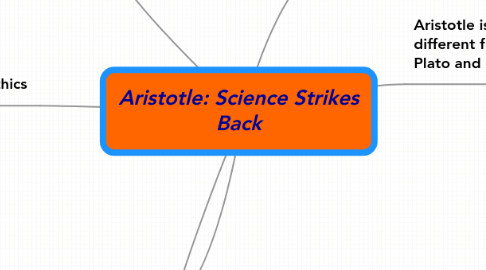
1. Aristotle's Biology
1.1. "All men by nature desire to know. An example is the delight we take in our senses."
1.1.1. Nature does nothing by chance
1.1.1.1. we have been given senses to use them to understand the world.
1.2. To get knowledgewe must begin with our senses
1.2.1. Human biology creates our senses
1.2.1.1. These senses help us obtain knowledge
2. Teleological System
2.1. Everything in the world has a cause - things that drive them to be created
2.1.1. Material Cause: the material form in which the thing is made
2.1.1.1. Doryphoros (Roman Copy)-material cause is marble
2.1.2. Formal Cause: The shape or form a thing must take in order to be recognized
2.1.2.1. Doryphoros (Roman Copy)-uses contraposto, holding spear, head is tilted slightly to the left
2.1.3. Efficient cause: The actual force used to make the thing
2.1.3.1. Doryphoros (Roman Copy)-Chisel, hammer, sand paper
2.1.4. Final Cause: The ultimate purpose of the thing.
2.1.4.1. Doryphoros (Roman Copy)-teaches the use of reason
2.1.4.1.1. Shows a man thinking about what he is going to do before he acts and fights
2.1.4.1.2. Conforms to phi-the perfect mathematical ratio
2.2. The purpose of all art is to teach
2.3. "If the art of ship building were in the wood, we would have ships by nature"
2.3.1. The wood does not naturally just create a ship
2.3.2. The creator needs to think and plan out what he will do with the wood before he can make a well built ship.
3. Where Are the Forms?
3.1. The forms are inside the things themselvs
3.1.1. DNA is an example of a built in form of living things
3.1.2. An acorn has a built in form and will always become an oak tree when it matures
3.2. Everything we see is part of a teleological (Goal Oriented) system
3.2.1. Our goal is to be happy
4. Application to Ethics
4.1. The final cause for which humans are created is happiness-Eudaimonia
4.2. Ethics is the study of how humans can obtain happiness.
4.2.1. Breaks this concept down scientifically and provides very specific ways for a person to become happy
4.2.1.1. The only way to obtain virtue is through practice
5. Our Senses Are Different From Those of Other Animals
5.1. All forms of life have naturative, reproductive and locomotive power.
5.1.1. Animals differ because the have the power of sensation and perception
5.1.1.1. more complex animals have intellectual power (problem solving abilities).
5.1.1.1.1. ie. beavers make dams to control the flow of water
5.1.1.2. Humans also have reason, which is the ability to comprehend universals
5.1.1.2.1. Universals=art, math, science
6. Aristotle is different from Plato and Socrates
6.1. Aristotle is a scientific and practical thinker
6.1.1. If he can't see it, it doesn't exist
6.1.1.1. Doesn't believe in the world of forms-Plato
6.1.2. Its existence needs to be proved with the senses
